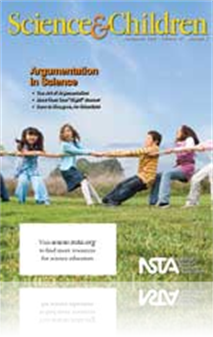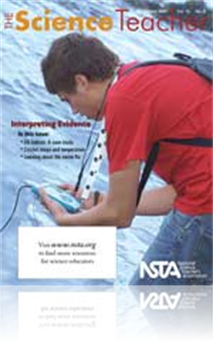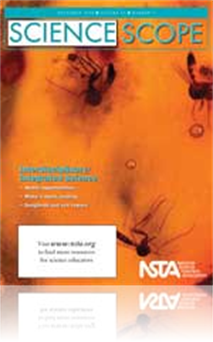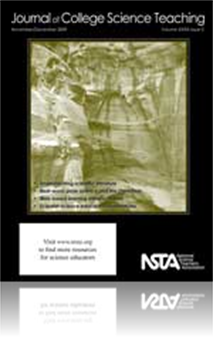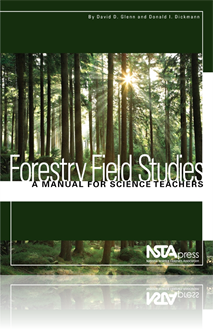All Resources
Journal Article
Science Shorts: Solar Pizza Friday
In an effort to bridge the gap between science and technology and its effects on everyday life, this lesson engages students in a study of solar energy and technological design. Students make real world connections and develop their skills in scienti...
Journal Article
Elk Habitat: A Case Study of Scientific Inquiry
A case study is an excellent way to help students think like scientists as they work to solve a dilemma. This article describes a case study of elk in Yellowstone National Park. Students read short narratives, based on scientific research data, about...
Journal Article
Every Day Science: November 2009
This monthly feature contains facts and challenges for the science explorer. ...
Journal Article
With the range of conflicting ideas about issues such as climate change and global warming, it has never been more important to let our students outside—beyond the classroom door—to evaluate the validity of such claims by observing nature, collec...
Journal Article
Science Sampler: Global Warming Project
To address the issue of global warming locally, the author developed an inquiry-based project to examine the impact of the school’s traffic situation on climate change. In this project, students collected data in the parking lot/driveway, researche...
Journal Article
Case Study: The Wisdom of Groups
What is it about small groups that make them so powerful? The answer is straightforward: Groups tend to solve problems better than even the brightest individuals because “many hands make light work,” and “two heads are better than one.” This ...
Journal Article
Often the differences students see in science and mathematics classrooms are in perspective, approach, or application. Understanding those differences can help teachers to present a unified picture of mathematics and science to their students. In thi...
Journal Article
Natural Resources: Digging Soil
It’s not hard to captivate children with the world of soil—many of them already love “dirt.” Plus, exploring soil requires no special equipment or field trips. Soil is everywhere, with only a shovel or trowel required. You just might need som...
Journal Article
Editorial: Unintentional Verbosity
Writing hurts, even for individuals who do it professionally. Consequently, because the birth of an essay, an article, or a book is so painful, we come to have a special affection for our words. This is both natural and necessary, but it makes editin...
Journal Article
Editor’s Roundtable: Weaving a web of learning
Teachers of all content areas, the arts included, must collaboratively plan meaningful instructional units around themes, issues, or problems that can be investigated and assessed using a cohesive, interdisciplinary approach. Instruction should activ...
Journal Article
Dare to Disagree, as Scientists
As argumentation is weaved into classroom lessons, students know what to ask, how to analyze the given information before forming a conclusion, and are able to support their reasoning with solid evidence. They will hold firm to their conclusions unti...
Journal Article
Search for the Golden Moon Bear: Using Reader’s Theater to Teach Science
Reader’s theater is an activity in which students, while reading directly from scripts, are able to tell a story in its most entertaining form. Typically, teachers create or purchase premade scripts of stories, and students focus on reading those s...
Journal Article
What is the Value of Course-Specific Learning Goals?
The authors examined student and faculty opinions regarding the use of detailed learning goals in three courses. Students reported the use of learning goals to be positive, aiding them with studying, in lectures, and in determining the important mate...
Journal Article
Amber: Using “Tree Tears Turned to Stone” to Teach Biology, Ecology, and More!
Amber is a fossil by itself, and can also contain plants and animals that lived millions of years ago. Some of these perfectly preserved specimens give scientists a convenient window to past environments, including the biology, ecology, geology, and ...
Journal Article
Editor’s Corner: Where’s the Evidence?
“What evidence do you have for that idea?” It is a simple question, but one asked far less than it should be. Too often, we hear justifications such as, “Everybody knows that ...,” “It’s what I’ve heard,” or “It’s just what I beli...
Journal Article
Idea Bank: Extra! Extra! Read All About the Universe!
This year we are celebrating the International Year of Astronomy (IYA). The IYA commemorates the 400th anniversary of Galileo’s first observations of the cosmos through a telescope. He never could have imagined how our view of the universe would co...
Journal Article
Methods and Strategies: Connecting Science and Literacy Through Talk
When students are motivated, engaged, and have opportunities to practice and develop discussion skills taught during literacy time, they can deepen their understanding of science concepts. Communication is an important tool for the development of sci...
Journal Article
The Prepared Practitioner: Data, Data Everywhere
We are awash in tables, charts, and graphs. Newspapers display data in every section—from economic information to sports statistics to weather reports. Even the entertainment section features data on television and movie viewing. Using empirical da...
Journal Article
The Early Years: A Reason to Write
Children love seeing their work and photos of themselves at work. Make this an opportunity for an early literacy experience by creating a book about a classroom investigation. Document each step of the process with photographs and student drawings. W...
Journal Article
Science 101: How can wind cause a bridge to collapse?
First, you might need evidence that wind can cause a bridge to collapse. To see the evidence, put “Tacoma Narrows Bridge collapse” into any internet search engine. Using this example from 1940 and a series of hands-on activities that demonstrate ...
Journal Article
Society for College Science Teachers: “it sais i have a D how that be”
We’ve all gotten them—the student emails that make you question your decision to get into this profession. The title of this column says it all. If we want students to meet our expectations, we must give them instruction on what we expect. Techno...
Journal Article
Scope on the Skies: Living with a star
Currently, our Sun is a content, middle-aged main sequence star steadily fusing hydrogen atoms into helium atoms and releasing radiation in many of the wavelengths making up the electromagnetic spectrum. So what happens between now and when the Sun r...
eBook
Forestry Field Studies: A Manual for Science Teachers (e-book)
Why forestry field studies? As experienced teachers of scientific ecology and forestry concepts, we believe that a forest or woodlot can provide teachers and their students with the perfect laboratory for understanding some of the basic principles of...



